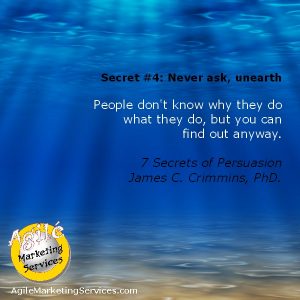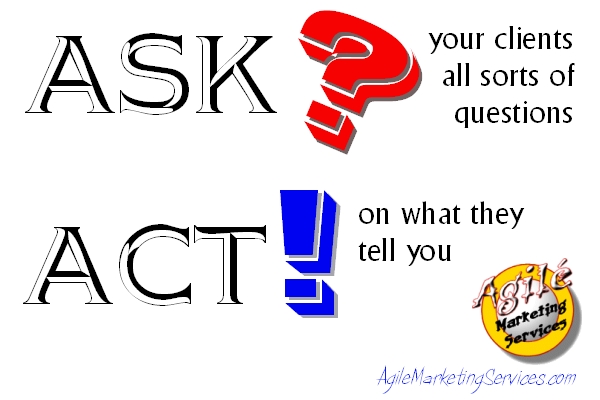ask
Engage People On Social Media By Asking Questions
Can I ASK You A Question?
Video – Poll Your Customers
So how do you know how your business is doing? Well, you could measure a bunch of different things and come up with numbers. Compare numbers: this month’s sales this year versus this month’s sales last year and that sort of thing. That’s a financial way of of of measuring things and finding out how you doing.
I have another suggestion for you. Ask. Ask your current clients how you’re doing, what kinds of things they want. What kind of things about you and your business make them happy. What kinds of things would they want instead. Is it something you do? That you don’t do? Can you offer them another service? Can you offer them a recommendation to somebody else who does that type of service? You need to find out.
Asking Rarely Hurts
 My wife and I are spending some quality time in the Southwest US. Specifically, Albuquerque New Mexico. A couple days back, we went to the 10th Annual Salsa Fiesta held in Old Town, ABQ.
My wife and I are spending some quality time in the Southwest US. Specifically, Albuquerque New Mexico. A couple days back, we went to the 10th Annual Salsa Fiesta held in Old Town, ABQ.
I’m a wimp. I was only able to make it through two of the three tents filled with contestants and their salsa samples. In one of the tents, one of the contestants was urging the public to vote for them as the winners. The staff at the booth asked, in loud voices: “Please vote for booth #18. Remember, when you vote, please vote for booth 18.”
Three Letter Words
We’re all familiar with the euphemism “four letter words.” There seem to be a lot of those in our vocabulary. But there are a small handful of three letter words that should be in your every day business repertoire. I’d like to go over three of them with you now.
I have one client who runs a restaurant. We were talking about increasing his business without having to spend a lot of money. I told him it was easy, and told him about the first word. He was doubtful – the word was so simple, so direct. No trickery, no smoke and mirrors. I didn’t even have the decency to charge him for the wisdom. He said he’d think about it and get back to me.
A couple weeks later, my wife and I were in his restaurant for dinner when the owner came out to greet a couple of the tables. He turned to approach one of the tables and saw me. His face turned bright red. He turned to face his customers.
“Is your dinner all right? Anything you need?”
“Everything’s excellent,” they said.
“In that case. . .” The owner cleared his throat. “In that case, please join us again soon and consider bringing along some friends.” The owner scurried off for the safety of his kitchen, while the couple resumed their conversation.
The restaurateur called me a few days later. “It worked!” he yelled. “That couple came in the next night, and brought two other couples with them. One of those couples has already been back!”
The first word you need to internalize and use as a Recognized Expert is “ASK.” People wonder why I spell it in all caps. I used to tell them it stood for “Acquire Specialized Knowledge” or some such, but the real reason is this: it’s a damned important word! In this case, the owner ASKed his patrons if they were happy with their experience at his establishment. Then he ASKed them to return, and bring more business with them. They did.
We all want to find the perfect client who buys often, and purchases high-profit-margin goods and services. How do you find out what else they want to buy from us? ASK. No special tricks are needed. Just call or email – or better, ask them in person. “What can we offer you that we currently don’t? What would make you refer us to your friends?”
ASKing is especially important when it comes to sales. A lot of people are afraid to ask for the sale. True, you may get denied, but then you can ASK follow-up questions to find out why.
On the heels of ASK comes our second word. Once you get feedback to your question, you must ACT on that information in order to effect a change. Even if the only ACT is to tell the person who made a suggestion that you considered their suggestion, but aren’t implementing it right now, you need to ACT.
Imagine you run a carpet cleaning business. You ASK a client what you could offer them in addition to cleaning services. “Well, how about some environmentally friendly cleaning products I can use between professional cleanings?” Now you need to ACT on that suggestion, sourcing the best eco-friendly products and adding them to your sales presentation.
If you remember to ASK and ACT, you’re well on your way to becoming our third three letter word: a Recognized Expert PRO.
Educate, Then Sell
Years ago, I had an unusual interaction with a sales person. It was winter, about 7:30 PM so it was already dark. My house is set back away from the road, and my driveway is over a 10th of a mile long. Not expecting any one, my outdoor lights were out.
I’m in my office when suddenly there’s a loud, frantic banging at my door. Remembering that there had been a bad accident on the road in front of my house only a couple weeks before, I ran down the stairs full of dread and threw open the door.
Standing there was a gentleman in parka and gloves, grinning and pointing to a large picture.
“What? Can I help you?”
He continued to grin, pointing to the pic and nodding at it. Obviously no-one was hurt. My anxiety level started to drop.
“It’s a picture.”
“Yep,” he said. “It’s an aerial picture.”
“Uh huh.”
“Of your house. I’m selling it.”
“I’m not buying it.”
His happy demeanor instantly turned to anger-tinged sadness.
“Jeez man, you don’t have to be so rude about it!”
I was dumbfounded. I didn’t think I’d been rude at all. I didn’t visit his house in the dark, pound on the door like there was someone on fire, and then expect him to automatically buy what I was holding in my hand.
“Good luck elsewhere. Have a nice night.” I shut the door, shaking my head.
It’s true – a picture is worth a thousand words. And I suppose when you’re selling one, the prospect should recognize it’s worth instantly. But even when you’re looking to sell something you think of as basic and self-explanitory, it’s always a good idea to educate your prospects. I know I’ve used this example before, but look at the places in your local mall food court giving away samples on a toothpick. You’re hungry, it’s food, buy it! But the sample is the most basic form of education: “This is what it’s like.”
Providing any type of education prior to a sales attempt allows you to separate the merely bored from actual prospects. It also provides the prospect with a better understanding of your product or service, and how it relates to their lives right now. Delivering educational information about your product or service also allows you to build a story around the pitch, and involve yourself and the prospect in the story.
“Hi, I’m Joe. Earlier this year, I went up in a two-seat plane with my pal Dave. You should see how clean and green everything looks from just a few hundred feet in the air! We were flying over your neighborhood when I began snapping pictures of some of the houses. Once I saw how nicely they came out, I knew I had to offer the owners of those houses the opportunity to share the experience of seeing their property from the air.”
Five sentences to build that story and offer some education, as well as pre-frame the sale. Now he can begin asking the sales questions. The whole thing could take less than a minute.




